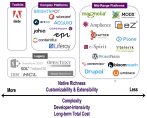Should IAs be building applications without engineers?
A former colleague of mine, one of the smartest engineers I have ever had the pleasure of working with, recently attended "developer training" for WCM vendor Percussion. He noted that during the entire week of training, he was not required to learn or write a single line of code. Instead, he learned how to use a browser-based configuration interface to set up Percussion's WCM software and get it running.
To me, this seemed like an utter waste of this engineer's time. Yet when we discussed that an engineer may no longer be needed to set up and configure a WCM system, well, then who is? He couldn't imagine who else to send to the training -- an Information Architect (IA)? The HTML and scripting guy? What about that role we often talk about, but few are able to define: the "content manager"? Enterprises may have content managers, but systems integrators surely don't. So who should be configuring the CMS? We attempted to craft a description of the "CMS Specialist" over dinner one evening, and saw this person as a sort of tech-savvy IA. However, we could think of very few people who could fit the bill.
This morning, on a briefing with Search & Information Access vendor Endeca, I was struck by a comment made about the new browser-based configuration interface they're debuting soon with version 6.0. "This is so IAs can build these applications," they said, as several snazzy configuration interfaces flashed by on the screen. To be fair, they did draw a clear distinction between the configurator and the true development environment, but as a buyer, be aware that the configurator doesn't eliminate the need for serious development in most cases.
We've written about the Configurator Conundrum in the past, warning about the dangers of making it too easy to modify applications without suitable controls. As a former information architect myself, I would never, ever want to be left alone with one of these interfaces and be expected to modify an enterprise WCMS, Business Intelligence, or Information Access application. Through 10 years of implementations, I always valued the lead engineer on my team like a precious diamond, and still would, no matter how "easy" these interfaces seem. There's too many nuances involved to over-simplify setting up an enterprise WCM or search system.
So this begs the question, should IAs be building applications without engineers? It's a nice idea, but perhaps we're taking the metaphor of empowering the business person a little too far. The best answer is perhaps a role somewhere in between. In a Search and Information Access scenario, it would be someone with the information architecture knowledge to know how information and interfaces should behave on the front end, but with enough knowledge of back-end metadata, repositories, and search engine tuning to be able to tweak the results. This would not be an easy role to fill, or even an easy job description to write, but it's perhaps the ideal "search manager."
As I see it, these browser-based configurators are mostly demo candy for screens that will ultimately require a developer to master regardless. For configurators to have real value, we'll need to see a whole new set of roles in the enterprise -- roles that few people have the talent and know-how to fill today.








